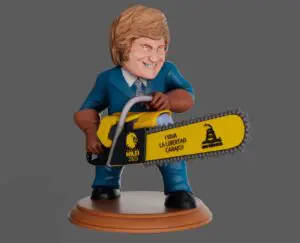It’s not a new dance craze sweeping the nation or the latest internet challenge (think Ice Bucket Challenge). No, DOGE is a backronym that famed billionaire Elon Musk created or at least popularized. It stands for “Department of Government Efficiency.” The concept is still loose but coalescing around the idea of an outside group analyzing and streamlining government workflows.
Department of Government Efficiency
pic.twitter.com/mlI25deCBn— Elon Musk (@elonmusk) November 2, 2024
If you ask the average person what the goal of such a program would be, the answer is to shrink the size and scope of government. That’s a cause we should all support. To put an exclamation point on this, Musk said a noble goal is to reduce the US Government from 428 agencies to just 99. Even if the effort only yielded half that much, it’d still be a smashing success!
These things don’t happen in a vacuum, though. About a year ago, Javier Milei took over as Argentina’s president. In a viral video, Milei can be seen ripping whole agencies out of his government’s organizational chart. Milei has become such a pop culture icon that someone made a downloadable Javier Milei bobblehead (that doesn’t bobble) holding a chainsaw inscribed with “Long Live Freedom, Damn it!” You can probably trigger a bunch of socialist librarians by 3d printing one at your local public library. If DIY isn’t your thing, they’re also available fully assembled and painted on eBay and Amazon.
Should we be doing this in Louisiana? Absolutely!
We’ve all been watching a live-action version of that famous Theodore Roosevelt quote: “The most successful politician is he who says what the people are thinking most often and in the loudest voice.” I’ve been waiting for Jeff Landry, a very good politician in his own right, to jump on the trend – and jump he has. In a press release on December 12th, Jeff Landry announced the Fiscal Responsibility Program. Although a less fun-sounding name than DOGE, the FRP (Fiscal Responsibility Program) is now an official effort in Louisiana.
As the state’s premier government transparency organization, our group is incredibly excited about the possibilities of this effort. We’re living in what should be Louisiana’s perfect storm for government reform. However, in the eyes of most Louisianans, the result of throwing a bunch of legislators into a room together has been, well, lackluster. During the latest iteration, we all got revenue-neutral-ed to death. But that was then, and this is now.
I have a suggestion
Looking back, Louisiana’s historical tradition is widely known for our double-dealing, grifting politicians. Why do they do it? Because people are generally just greedy, self-centered jerks. The trick is figuring out how to use that to our advantage.
Louisiana doesn’t have its own chainsaw-wielding Javier Milei. However, we do have a new FRP (Fiscal Responsibility Program). Of the program’s nine members, eight are part-time legislators, and Steve Orlando is the “Fiscal Responsibility Czar.” The legislative members include four from the Senate and four from the House. Senate President Cameron Henry has appointed Valarie Hodges, Blake Miguez, Gerald Boudreaux, and Jeremy Stine. On the house side, Speaker Phillip DeVillier has appointed Jack McFarland, Adrian Fisher, Phillip Tarver, and Stephanie Berault
That’s a great start, but such a Herculean effort could use more than nine people. But we can’t create a whole new department with a huge payroll and still claim to be reducing government. What to do? Would you believe there’s a way to have tens of thousands of people working on this project for free?
History provides an answer
As a voracious reader and history lover, I know historical figures can provide real-world examples of accomplishing great things in unexpected ways. One of my favorites was the story of Harry Truman, as told by author David McCullough. Deep in the pages are numerous reflections on how someone like Truman rose from obscurity to become President of the United States. It turns out that his method for advancing things (including himself) was relatively effortless.
Truman’s model is one we regularly borrow from here at Citizens for A New Louisiana. That is, find the existing flow and get in it. The concept reminds us that there are things all around us already in motion. Truman’s metaphor was like the flow of a river. If you try swimming upstream, you’ll wear yourself out while not getting very far. Instead, he jumped in and let the river carry him in the direction it was already moving. Another interesting observation was that, especially in the turns, one side of the river moved faster than the other.
Finding the flow
In this case (as with most others we utilize here at Citizens for a New Louisiana), the flow is human nature. People tend to do things that benefit themselves. Another metaphor for this concept is “The Invisible Hand,” alluded to in Adam Smith’s book, the Wealth of Nations. Smith reports, “It is not from the benevolence of the butcher, the brewer, or the baker, that we expect our dinner, but from their regard to their own interest.”
So, how do we turn self-interest into the motivating force for reducing the size and scope of government? What if FRP (Fiscal Responsibility Program) could make cost-cutting profitable to the individual bureaucrat? Think of it like this: if you paid a bureaucrat 25¢ for every dollar he saved the state, he’d earn bonus money while saving taxpayers more than it cost. Certainly, that 25¢ number is just an example. The FRP would earn its keep by determining the actual amount and establishing some limits.
To keep this from becoming yet another grift (which it will without proper oversight), these cost savings proposals must be submitted to and approved by the nine-member FRP (Fiscal Responsibility Program). That gives them a critical but less burdensome role than playing hide-and-seek with thousands of overly defensive bureaucrats across countless government agencies.
Force multipliers?
So far, so good. But we can kick this up another level. First, we need a plan that anticipates and overcomes resistance without knowing where it might come from. Back to human nature, our most likely resistance will come from trying to play whack-a-mole with middle management who like their budget just like it is. How do we address that?
A good solution would resolve this problem while simultaneously multiplying the program’s success. So, let’s consider expanding the credit for cost-saving ideas. We should all know this famous Truman quote (later used by Reagan), “It is amazing what you can accomplish if you do not care who gets the credit.” Now, indeed, there will be someone with an idea that deserves to be rewarded. What could it mean to share the credit?
In a system like this, the FRP (Fiscal Responsibility Program) will probably choke on the tsunami of ideas (good and bad). However, I’ve already introduced the concept of combining multiple techniques to multiply the results. So, let’s tweak the model. We can give the final approval responsibility to the FRP while democratizing the filtering. Someone with direct knowledge should review the cost-saving idea before it gets to the FRP for a bonus payment. The natural person to do that would be the affected section’s department supervisor, who would receive a portion of the credit (and reward) for bringing the idea forward.
More to come?
Look what we’ve already accomplished. Instead of a top-down model run by a czar and eight part-time legislators, we’ve established a bottom-up policy that empowers the entire bureaucracy to want to cut itself. Tens of thousands of bureaucrats will have an opportunity to be handsomely rewarded for identifying ways to reduce government largess.
Do we stop here? Of course not! In a future article, I’ll share a concept I’ve been personally trying to implement in Louisiana for as long as Citizens for a New Louisiana has been around. It’s a way to involve the general public in saving the state money while also getting paid based on the savings their ideas generate. Our past efforts to get this system through the legislature failed because lawmakers lacked the motivation. However, all that’s changed now that Governor Landry has issued an executive order establishing an FRP (Fiscal Responsibility Program).
So, stay tuned!
###









